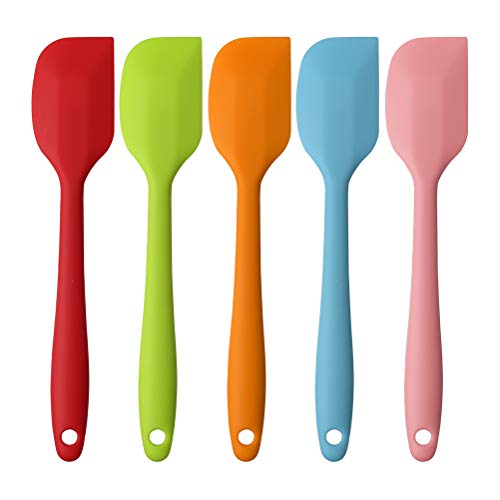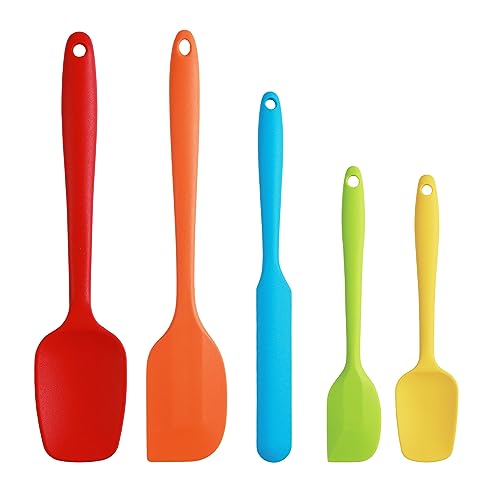Silicone
Silicone is widely considered to be the best material for spatulas. The reasons for this are its heat resistance, flexibility, and nonstick properties. Silicone spatulas can withstand high temperatures without melting or deforming, making them suitable for cooking tasks such as flipping pancakes or sautéing vegetables.
Furthermore, silicone spatulas have a flexible head that can easily bend and contour to the shape of the pan or bowl, ensuring that no food is left behind. This flexibility also makes silicone spatulas gentle on nonstick cookware, preventing scratches and damage.
The nonstick properties of silicone spatulas are also highly desirable. They can easily glide through sticky batters and sauces without leaving any residue behind. Cleaning silicone spatulas is a breeze as well, as most food particles slide off effortlessly.
Stainless Steel
Stainless steel spatulas are another popular choice among professional chefs and cooking enthusiasts. They are known for their durability and longevity, as stainless steel is resistant to rust and corrosion. This makes stainless steel spatulas a reliable tool that can withstand heavy use and regular cleaning.
Stainless steel spatulas also have a firm and sturdy construction, allowing for greater control and precision while flipping or stirring food. They are less flexible compared to silicone spatulas but are still versatile enough to handle a wide range of cooking tasks. They can be used for flipping delicate fish fillets or scraping the bottom of a pan to deglaze it.
One important thing to note is that stainless steel spatulas may not be suitable for nonstick cookware. Their rigid edges and surface could potentially scratch or damage the nonstick coating. Therefore, it is advisable to use stainless steel spatulas with other types of cookware such as stainless steel or cast iron.
Wood
Wooden spatulas have been a traditional choice for many kitchen enthusiasts. They are natural, eco-friendly, and have a classic aesthetic appeal. Wooden spatulas are gentle on delicate cookware, such as nonstick pans, as they do not scratch or damage the surface.
Wooden spatulas also have the advantage of not conducting heat, making them safe to use even in high-temperature cooking. They are ideal for tasks such as stirring sauces or serving dishes, where the heat from the pan or pot is a concern.
However, wooden spatulas require regular maintenance and care. They should be hand-washed and dried immediately to prevent water damage or mold growth. Additionally, they may need to be seasoned with cooking oil periodically to maintain their longevity and prevent cracking.
Nylon
Nylon spatulas are a popular choice for beginner cooks and those with nonstick cookware. They are affordable, versatile, and come in a wide range of sizes and shapes. Nylon spatulas are lightweight and easy to handle, making them perfect for flipping delicate foods such as eggs or pancakes.
One of the key advantages of nylon spatulas is their nonstick properties. They can easily slide under food without causing any damage or scratching to nonstick surfaces. Nylon spatulas are also heat resistant up to a certain temperature, making them suitable for most cooking tasks.
However, nylon spatulas may not be as durable as other materials. They can melt or deform if exposed to high heat, so it is important to be cautious and avoid using them in direct contact with open flames or extremely hot pans. Regular inspection and replacement of worn-out nylon spatulas are recommended to ensure food safety and hygiene.
Rubber
Rubber spatulas, often made from a combination of rubber and plastic, are known for their flexibility and durability. They are commonly used for baking tasks, such as folding batter or scraping the sides of mixing bowls. Rubber spatulas are gentle on delicate ingredients and are perfect for ensuring that every last bit of batter or dough is incorporated.
One of the main advantages of rubber spatulas is their ability to withstand high heat. They can be used for cooking tasks such as stirring sauces on the stovetop or sautéing vegetables. Rubber spatulas are also resistant to staining and discoloration, making them easy to clean and maintain.
However, it is important to note that rubber spatulas may not be suitable for use with extremely high temperatures, such as grilling or broiling. Excessive heat exposure can cause them to melt or warp, compromising their effectiveness and safety.






